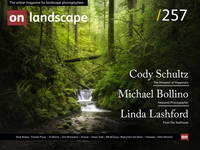
Rising from the Ashes
Australia is the driest and most fire-prone continent on Earth and every summer bushfires sweep across the landscape. The 2019-2020 bushfire season was amongst the worst the country has experienced and has become known as “Black Summer”. more

One Square Mile
I’ve barely had a conversation with a landscape photographer in the last few years that hasn’t at some point touched upon the ‘carbon guilt’ complex from which we all suffer more

Water and Fire
At grassroots level, as well as governmental. As photographers, we can share our ideas, our images, our concern and our determination. more

Gheorghe Popa
It is strange that although one is a natural lake and the other one is an artificial lake filled with poison, to me they have things in common, like the trees in the water. more

Southern Manscapes
Man's influence on the landscape here is obvious and almost unavoidable photographically. I decided to embrace this and to make the transformation of the land and man's influence on it the subject of the photographs. more

The Trailings Project
It's the small things that make our world worth living in and help us to know that we are human, we are vulnerable. We are. fragile, but we can heal. more

Loss in the Landscape
In September 2019 a funeral service was held on the former bed of the Pizol Glacier in Switzerland1. The glacier had lost 80% of its volume since 2006 and was now small enough to be declared dead by those mourners present. more

Humans at Work
In the early 1980s, I graduated from Edinburgh University with an honours degree in Environmental Chemistry. My final year research dissertation examined chemical processes involved in the destruction of the ozone layer. I never went on to pursue a scientific career because, back then, environmentalism really wasn’t taken seriously and there were very few jobs that weren’t about trying to keep the big polluters just about on the right side of the law. more

Don’t Destroy the Cypress Swamp Experience!
There is no better place to be explored by a kayak, than these swamps. One just glides effortlessly and silently through a magical wonderland, chooses his own route, his own tempo. more

Hal Gage
Being an artist has meant not steering my creativity to push an agenda. I think Ansel Adams had his internal turmoil about keeping his motives pure: even after becoming a de facto spokesman for the Sierra Club where he lobbied Congress on environmental matters more

The Hydrocarbon Forest
In the case of the Allegheny, private access to mineral rights covers 93 percent of the forest area. The impact has been profound. Maps from the 1930s show a dense grid of oil wells stretching for many miles. more

Altered Landscape
Altered landscapes are a brutal fact of the world around us. They speak of our insatiable appetite for earth’s resources and are a warning of what might happen if we continue the unchecked development and globalisation strategy of the last decades. more

Celebrating Wilderness Photographer Philip Hyde
Although the photographic world has changed dramatically since Phil was pioneering conservation photography, the great need for vigilance, activism and the sharing of our photographs to inspire others has not. more

Love Dandelions
Could we use our creativity and skill, our dedication and commitment, to raise the profile of specific issues and/or might we link in with the scientists from Wildlife Trusts, conservation bodies and local universities? more

Listening to the Arctic
The best way to make observations in the Arctic is to be passive, to drift with the dynamic frozen ocean. The German Icebreaker Polarstern has been doing exactly that since the start of October 2019. more

